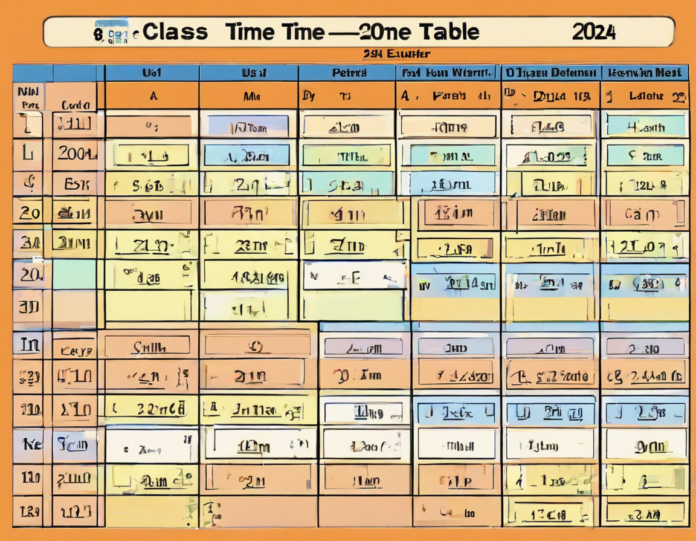As the new school year approaches, creating the perfect timetable for 8th graders is essential for ensuring a balanced and productive academic experience. A well-structured timetable not only organizes students’ daily schedules but also plays a crucial role in optimizing learning efficiency and supporting their overall development. In this guide, we will delve into the key components of designing an effective 8th-grade timetable for the upcoming school year.
Setting the Foundation
Understanding the Curriculum: Before crafting the timetable, it’s crucial to have a clear understanding of the curriculum requirements for 8th graders. Familiarize yourself with the core subjects, elective courses, and any specific educational goals or standards set by the school or district.
Identifying Student Needs: Consider the individual needs and strengths of the students in your class. Take into account factors such as learning styles, academic abilities, and extracurricular commitments when planning the timetable.
Key Elements of a Well-Structured Timetable
1. Balanced Subject Distribution
Distribute core subjects such as Mathematics, English Language Arts, Science, and Social Studies evenly throughout the week. Allocate sufficient time for each subject based on its importance and complexity.
2. Incorporating Electives and Specialized Classes
Include elective courses such as Foreign Languages, Art, Music, or Physical Education to provide students with a well-rounded education. Consider students’ interests and career goals when selecting elective options.
3. Integrate Study Periods and Breaks
Schedule dedicated study periods or homework time within the timetable to encourage good study habits and time management skills. Include short breaks between classes to allow students to recharge and refocus.
4. Physical Activity and Recreation
Prioritize physical activity by including recess, physical education classes, or outdoor activities in the timetable. Regular exercise promotes overall health and enhances students’ cognitive function.
5. Project-Based Learning and Collaborative Activities
Allocate time for project-based learning, group discussions, and collaborative activities to foster creativity, critical thinking, and teamwork skills among students. These activities enhance practical learning and engagement.
Sample 8th Grade Timetable
| Time | Monday | Tuesday | Wednesday | Thursday | Friday |
|———————-|—————–|—————–|—————–|—————–|—————–|
| 8:00 – 8:45 AM | Math | Science | English | Social Studies | Math |
| 8:45 – 9:30 AM | Science | English | Social Studies | Math | Science |
| 9:30 – 10:15 AM | English | Social Studies | Math | Science | English |
| 10:15 – 10:30 AM | Break | Break | Break | Break | Break |
| 10:30 – 11:15 AM | Elective 1 | Elective 2 | Physical Ed. | Math | Science |
| 11:15 – 12:00 PM | Lunch | Math | Science | English | Social Studies |
| 12:00 – 12:45 PM | Social Studies | Math | Science | English | Social Studies |
| 12:45 – 1:30 PM | Science | English | Social Studies | Math | Elective 1 |
| 1:30 – 2:15 PM | Elective 2 | Break | Break | Break | Break |
Frequently Asked Questions (FAQs)
1. How many subjects should be covered in an 8th-grade timetable?
In an ideal 8th-grade timetable, core subjects like Mathematics, English Language Arts, Science, and Social Studies should be included along with a couple of elective courses.
2. Is it important to include physical education in the timetable?
Yes, incorporating physical education classes or outdoor activities is crucial for promoting physical health, reducing stress, and enhancing cognitive functions among 8th graders.
3. How can project-based learning benefit students in 8th grade?
Project-based learning encourages students to apply classroom knowledge to real-world scenarios, fosters creativity, critical thinking, and collaboration skills, and enhances overall engagement in the learning process.
4. What is the recommended duration for study periods or homework time in the timetable?
Allocating 30-45 minutes per day for study periods or homework time in the 8th-grade timetable can help students develop effective study habits and time management skills.
5. How can teachers accommodate students with diverse learning needs in the timetable?
Teachers can incorporate differentiated instruction strategies, provide extra support during designated intervention periods, and offer flexible learning options to accommodate diverse learning needs within the 8th-grade timetable.
Designing a perfect 8th-grade timetable involves careful consideration of curriculum requirements, student needs, and best practices in education. By incorporating a balanced mix of core subjects, electives, study periods, physical activities, and collaborative learning opportunities, educators can create a timetable that fosters academic growth, creativity, and overall well-being for 8th graders.









